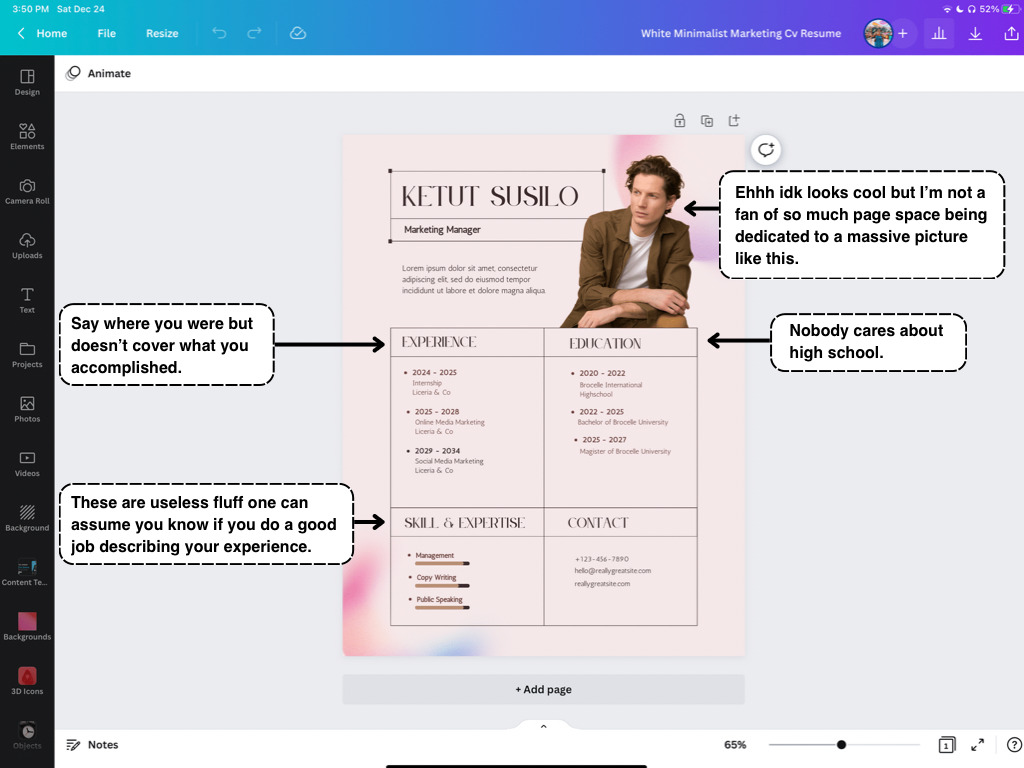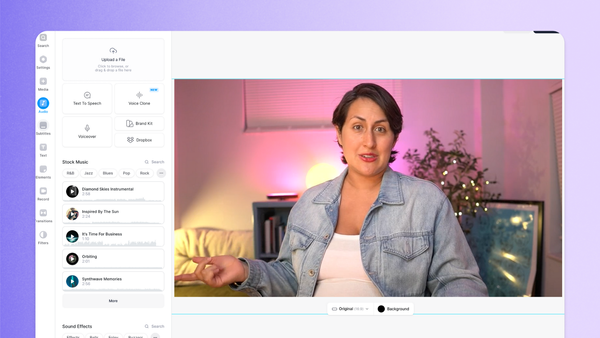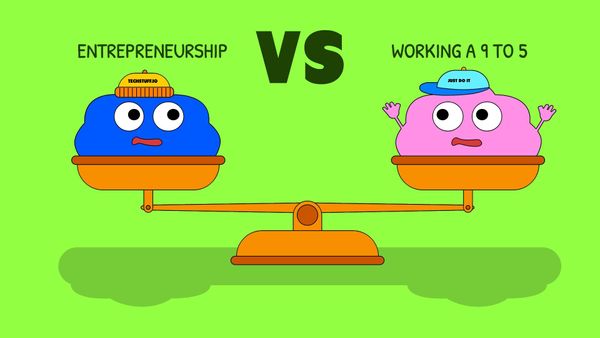Now that I’m a hiring manager it can feel near impossible to find the right full-time content hire (especially when hiring for mid-level roles or above).
On the other hand, when you’re the one interviewing for a new job, it's like nobody sees what you bring to the table.
- You've worked on successful content initiatives
- You know content like the palm of your hand
- You have raving reviews
But you never pass the "final boss" of interviews. It’s like you think you drove all the right points home yet they never truly penetrated the hiring manager’s skull. You're misunderstood. And so it’s easy to come to the assumption that all these companies are stupid soon-to-be-extinct marketing dinosaurs.
They don't get content.
They don't get you.
But you believe one day the right one will finally see you…right?
I've been in that boat before as the misunderstood marketer. It was always a bad application. Bad interview. Bad job. Bad everything but me. Lather, rinse, and repeat in a mindless fashion.
At the time, I didn’t realize what's obvious to me is not obvious to others. It’s possible to be good at your content job and okayish at making content for landing a job (e.g. resume, cover letters, outreach, interview skills).
In my experience, it comes down to two main reason most of the time.
- Some people don't know how to package up their wins.
- Others are “humble” to a fault where it feels wrong to "brag".
But interviews are the best time to brag, tell stories to show you're a problem solver, and communicate where you do or don't stand.
Now the tables have turned. I’m the one hiring.
The mistakes I made and others make have never been more obvious.
This blog is going to share EXACTLY what someone like me looks for (in general) when hiring for mid-level to senior level content-related roles be it a senior content marketer or a content creator. For added context in case you’re new here I’m currently head of content at VEED.
And although this is written from my way of running my ship, I believe this will apply to most other hiring scenarios for content roles.
More people need to become comfortable with breaking the “rules” of showcasing themselves to become the top 1% of content applicants.
Now here’s where most of you might be falling short, how you can increase your chances of getting your resume seen and impressing everyone.
A lot of people like to separate social media marketing and content marketing. I view social media marketers and creators as part of the content family. They need to work together to be successful but will not be measured equally.
Therefore, I will be referring to everyone who’s in a content-related role as content people.
📑 Resumes
Anyone can say they were responsible for a laundry list of tasks and initiatives. Few can speak to how those things were successful.
If you want to get that first interview in a competitive job market you're going to need to nail the following things with your resume.
Prove your business value is worth a conversation
Don’t just say WHAT you did.
Touch on WHY it’s impressive.
Here’s how I approach my areas of accountability and resulting achievements.
I avoid this…
And organize it more like this
It’s not that the qualitative bits don’t matter or deserve a place on your resume.
But when lines like “responsibilities include…” are all that’s there you’re not giving an overview of the business value you bring a company through content. Most content resumes focus on the responsibilities. Barely a handful of applications I see share relevant achievements resulting from their areas of accountability.
Regardless of whether you’re accountable for running a blog, editing videos for improved viewer retention, capturing awareness on social channels, or crafting higher-converting landing page copy—content is like a living breathing organism. Different content channels and the roles within a team depend on collaboration to not only help keep a company and its content alive but also thriving.
And as content people, it’s on you to convey in a resume you have a record of understanding how content plays a role in a business and its main KPIs.
Make your value unequivocally clear. Don’t make people dig to get the facts straight.
Let’s talk about what being unequivocally clear could look like next.
What to ask yourself when rewriting your resume
Most resume templates suck. They’re a good starting point but there’s often time-wasting chunks of “fat” to trim out.
After a while, all resumes start to feel like one big word blob when you’re clicking through them. It’s like everyone read the same article or used the same Canva template. It's like digging through blogs ranking on search results and seeing 10 bland posts on the same topic where not a single one has a clear angle to differentiate themselves from others.

Here’s something I often wonder about and am going to throw your way now…
How would you structure and word your application differently if you erased whatever preconceived notion you have for what a resume “should” look like?
- What would you remove?
- What would you add?
- What stories are hiding behind the bullet pointed achievements?
- How would you package it up with reader retention in mind?
The best applications I’ve come across break the mold.
When you’re designing a thumbnail for a YouTube video you’re looking to do so in a way that shows you:
- Nailed the search intent (show people they’re in the right place)
- Stands out from results (become the shiny object people gravitate towards)
This thinking even extends to packaging design at a grocery store. Designers research what else is on the shelf competing alongside their product so they can design packaging that draws your eye to them.
So why not think the same with your style of applying to a content job?
The one question I always often ask myself after reading a resume is so what? I ask this because I’ll wonder why and how do all these things you say you did matter for these companies?
👉 I wasn’t there.
👉 I don’t know the KPIs.
👉 I don’t know the story.
My personal preference?
Each experience could be like a short bullet-pointed story or key context nuggets where it gives a hiring manager and talent acquisition team a simple overview of:
- Company north star(s) / Your KPIs
- The goal and the problems/blockers
- Your areas of ownership and involvement
- The results
Normally, this is where I'd make a more in-depth breakdown of how to design this.
But if you want to avoid unintentionally blending into all the sameness you need to take lean into the answers and intuition you discover within when you reflect. Cheesy? Maybe...but it works.
So this is why I chose to throw questions your way. I want you to have something to poke and prod at with your mind but how you make something of it will vary based on your personal style and preferences.
🎤 Interviews
The resume gives a glimpse into what you owned and what resulted from the things you say you were responsible for.
From the hiring manager’s end the interview is a chance to see if:
- You really did those things (the amount of people that lie or over-inflate things is wild)
- Your brand of content thinking and if it aligns with the company
- You’re honest and self-aware enough to know how things could’ve been done better
- You did your research on the company
- We have chemistry since we’d work closely together
Because this will look different for different content people I wont try to make templates to tell these stories. I also think that would only stifle your voice and creativity.
Instead I’ll focus on how this normally goes wrong and how to course correct regardless of the type of role.
Share stories and solutions that prove you're a problem solver
Whenever I ask about an interesting win I normally also ask follow up questions to try and dissect the why, what, and how’s of it all.
But oftentimes I get anything but a well-delivered story.
Instead I get a word salad of random tactics and ideas that don’t give me a sense of how how this person’s success was measured, their knowledge of company KPIs, their ability to prioritize where their efforts/resources are best invested, the blockers they inevitably faced along the way, and the ability to then tell a clear story about how it all came together.
If you can’t walk me through your wins it tells me you don’t have as much experience and involvement as you say you do on your resume.
For example, I wouldn't tell someone I grew the VEED blog by writing good content and list off a bunch of different buzzwords. That just tells something the potential ingredients of success but not how they came together and why.
Here’s an example of an old content-related interview I ran where a candidate might have a strong resume but the interview doesn’t check out. I’ve hidden some details to not give away anything personal.
When you package up your wins they should address as many of the below points as possible:
What…
- What was the problem?
- What hurdles were you facing to solve it?
- What inputs did you take into consideration to make content decisions to multiply the success of your KPIs?
- What was your role/degree of involvement in reaching the solution?
- What did collaboration look like if other teams had to get involved?
Why…
- Why was the problem there in the first place?
- Why did you consider the inputs you took into consideration to make big content decisions?
How…
- How did you solve it (tell me the steps you took)?
- How did you address the hurdles you noticed at first?
- How would you do better if you had to do it all over?
- How did you get buy-in for your ideas?
For example, people are quick to say they focused on a handful of things to drive growth through content.
Where most people lack is explaining how they even landed on that small handful of focus areas. People like me want to hear how you figured out that by focusing on a particular channel, covering certain topics, and making any other key decisions you made would 3X, 5X, or 25X your results.
Anyone can say things like SEO or video marketing is important from a general perspective. So say the things few can say. How did you go about discovering in your particular situation that A, B, and C would be critical to your success?
Don't make your interviewer's head hurt from a rollercoaster of unstrung ideas.
Practice talking about your wins beforehand or else you risk saying a bunch of things in a way that lacks the flow of logical ideas leading into the next logical idea. Talk in front of a mirror, with someone you know, record yourself—whatever you like as long as you get practice.
Show people you not only did what you said you did but also show them your style of problem-solving. Practice how different parts of the story fall into place so you’re not going from the start to the end and back to the middle back to the start aaaand oh right…the end.
Be candid from day 1 or stay stuck in a loop of "bad jobs"
Content is often misunderstood and it’s probably your fault.
It pained me to write that but it’s the tough pill I needed to swallow around year three in my career as a social media marketer. 🥵
As more and more companies see the value of content they don’t fully understand its role either. It’s like they see this cool thing they need but because they’re not content people themselves they can’t be expected to fully get how it works.
The most successful content minds are unafraid to advocate for what they believe needs to be done (even if they won't always win). There will always be people who just don’t get it...yet.
The interview is no place to hold back on sharing about anything that matters to you for your success in this role. Remember, the interview goes both ways. You're also trying to gauge if the role is a fit for you.
How do you expect to know if you’re in a place where you’ll thrive the way you want and be aligned with your team? If you hold back on sharing your modus operandi it makes you seem unsure of yourself, unable to communicate, untrustworthy and it will 100% bite you in the ass in the long run.
Nothing will ever change for you if you don’t try doing something about it. I know it can be scary. It’s normal for it to feel somewhat unnatural especially if you’re transitioning into a higher-level role.
What I notice holds a significant chunk of people back is a mentality of helplessness, lack of accountability, and a willfully ignorant hope that things will change on their own. Most of the time you’re not a misunderstood visionary. There’s just a lack of self-awareness and difficulty tailoring your pitch to different people in a company.
This lack of self-awareness is a huge turn-off.
And this lesson is something I can’t personally teach you. From my experience, the passing of time and reflecting on failure are the best teachers for this particular lesson.
You need to practice advocating and getting buy-in for your ideas. Nobody will care and fight for these things more than you especially if you're the first or one of the first content people in a company.
You’re being interviewed because the company needs help. Say exactly whats on your mind. A healthy workplace will be open to new ideas. A toxic one will shut ideas down for no good reason other than their own ego and that’s a red flag for you to catch before you ever accept an offer.
It's an absolute dream to work somewhere where content marketing is already valued and understood.
When people don't get something this isn't necessarily a red flag. What you want to look for are open minds. Are people open to learning and being wrong or are they married to every opinion they hold?
📬 Cold messaging the hiring manager
While we may not be able to respond to every message we might see a lot of messages.
I recently saw an applicant in my DMs that sent me a short well-structured message with an engaging bite-sized video intro of themselves made with VEED. I then surfaced this person’s name to the TA to make sure to get them a first interview. It’s a nice added touch to try and do everything in your power to not go unseen and therefore not considered for the roles you really want in particular.
Most messages I see aren’t worthwhile because they simply say something like…
- Hey I applied and think I’m a great fit with no explainer on why
- They copy/paste their exact application in a message
- Asking if I can check if the application went through
If you message a hiring manager, do so in a way that makes every word count. Surface the highlights. Make it easy to digest and get them excited about you.
Throw in a video if you’re feeling extra bold.
And make sure to triple check your message before you hit send because you will have a first impression formed based on the content you send.
It’s not easy to land a job these days with so many layoffs happening at so many companies. Luckily this isn't the case for VEED. There are dozens of roles we’re hiring for and at the time of writing this the content marketing team will begin hiring for plenty of new exciting roles.
Whether you apply for a role on my team or at another company, learning how to stand out with your application is a simple yet often overlooked change that can go a long way.






